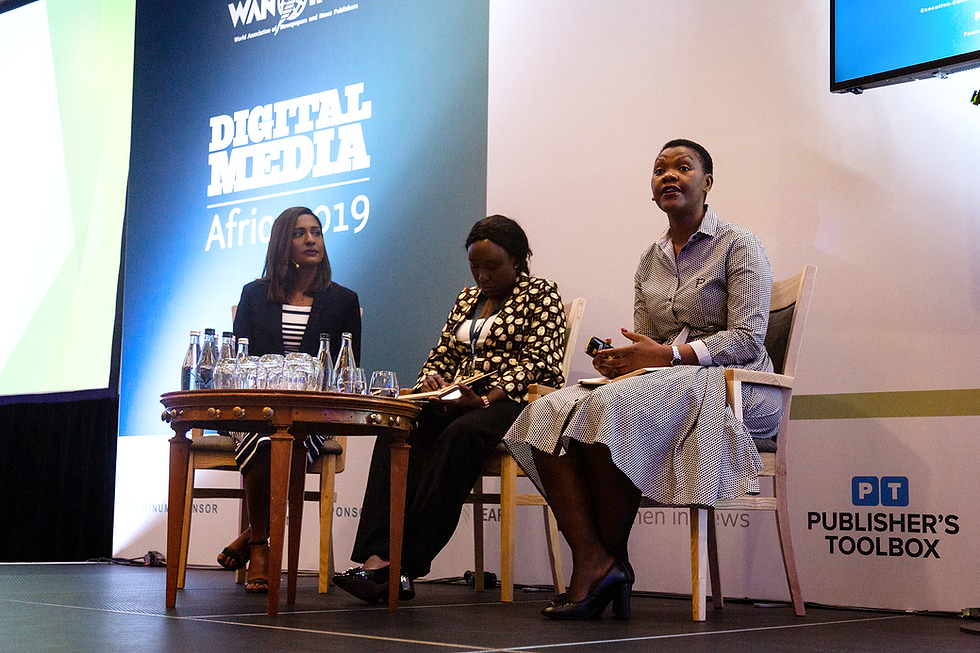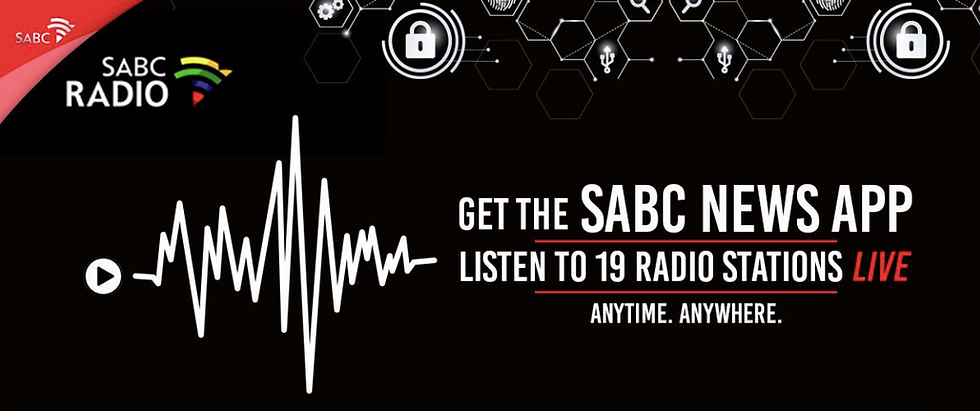Phathiswa Magopeni: It’s about remaining in tune with audience needs
- Tebogo Gantsa
- Sep 27, 2019
- 7 min read

Phathiswa Magopeni has a bold vision for South Africa's embattled public broadcaster - and for all other African news services. Magopeni is the Group Executive of News and Current Affairs at the South African Broadcasting Corporation (SABC).
The news service should have a citizen-centred approach and a responsive temperament - at least that is how Magopeni envisions the newsrooms at South Africa's public broadcaster. This, she says, would not only create a platform for robust debate and free expressions, but would also nurture a universal, premium content service with compelling programming.
For the SABC’s news division to get here, however, it will have to navigate very choppy waters - from the corporation's dire financial state to the negative impact that governance failures have had on public trust in the institution.
The full impact of financial decisions taken today might only come to light years down the line, but the work must start immediately. Restoring the broadcaster's credibility, however, is already underway, having started shortly after Magopeni was appointed in 2018. She says that in order to bring the SABC's day-to-day operations in line with the broadcaster's public mandate, they had to go back to the basics.
In repositioning the SABC News brand, Magopeni says the focus was mainly on restoring and rebuilding public trust and the legitimacy and credibility of SABC News. “We deliberately picked the values of independence and impartiality, espoused in our editorial policy, as the editorial principles that underpin the character of our journalism,” she explains. With this, she says, the principle of the broadcaster's public mandate came back to the centre of all editorial and administrative decisions.
Balancing the books
While private news organisations are mainly concerned with the bottom line, as a public broadcaster the SABC also has a long list of additional expectations to fulfil, as required by their public mandate.
Some realities, however, are indisputable and impossible to ignore - fulfilling the SABC News Division's mandate is incredibly resource intensive, and not yet geared towards large-scale revenue generation. Speaking at the Digital Media Africa conference that took place in Johannesburg in September, she said the SABC gets 84% of its revenues from advertising and sponsorships, with 3% coming from government grants.
The remaining 13% comes from television licences, but the reality is that very few people actually pay the R265 annual fee that is required by the SABC. From about 9.6 million active TV licences, only 2.6 million of them were fully paid in 2018 - just 28% of the total. One solution that the broadcaster is considering is to hike this annual fee by 5% to plug a gaping R3 billion revenue gap.
According to the South African Treasury’s ‘Estimates of National Expenditure’, licence fees, advertising and sports sponsorship are supposed to generate R23.7 billion over the next three years. The government grant is expected to add just R630.5 million in the same period.

Phathiswa Magopeni was a panelist at the Digital Media Africa conference held from 10 -12 September in Johannesburg, and talked about challenges SABC News faces in its revenue strategy.
Even with this clear breakdown of where the money might come from, the news division still doesn’t have carte blanche on how they generate or spend their revenue. This is dictated by the public mandate. “As a news division, the source of revenue that we rely on currently is customary advertising because the policy prohibits us from doing anything else, like product placement and sponsorship of news content.”
No leg room on revenue model options
Magopeni says this often means they don’t have the liberty to just follow any revenue model prescribed by industry experts, no matter how lucrative the returns may be. “It can’t be just because Company A is doing it,” she explains, regardless of whether 'Company A' is succeeding.
At the SABC, she explains, they have had to be wary of unintended consequences that come with trying to monetise content. Charging audiences for content can prevent potential news consumers from using the platform or accessing the news they need, and may dampen participation in discussion and engagement with content.
Magopeni believes the solution is to look at what they can do, and whether the newsroom is ready to take the next steps, especially given the ecosystem they find themselves in.

“Related to this, you have about 82% of what we have allocated as a division going to salaries - this is for permanent employees.” If freelance salaries are included in this, the numbers shoot up to 92% of the budget being spent on salaries.
But this cost structure is unavoidable given the intense and resource-heavy nature of news broadcasting. After all, she says, the newsrooms are driven by human resources. “Whether the numbers are right or not, that’s a different conversation. We know that the people that we hire are content themselves. The quality of our content relies heavily on the people that we bring as journalists.”
And these numbers can be staggering.
The South African Treasury expecting the public broadcaster's employee costs to increase at an average rate of 5.5% - from R2.8 billion in the 2018/19 financial year to R3.3 billion in 2021/22. Total revenue, on the other hand, is expected to grow at a much slower pace - an average rate of 4.2% annually.
Tough times
The going at the SABC has not been easy - from large-scale financial mismanagement and political interference under the reign of disgraced former COO Hlaudi Motsoeneng, to trying to rebuild the public trusts and newsroom morale amid talks of retrenchments, bankruptcy and organisational collapse.
While the SABC must be creative when it comes to choosing a revenue generating model, it still has to contend with bruising governance disagreements with state officials who represent government as a shareholder.
In the newsrooms, however, there has been a level of success. “Operationally, there has been a successful introduction of an integrated newsroom system, which is characterised by a single news diary that serves the needs of all our audiences across our various dissemination platforms.”
Magopeni says the integrated newsroom has helped plug content management slippages. It has also ensured consistency in the quality and character of SABC News' journalism across its platforms.“The greatest success of this approach has been the advantage of accessing the collective wisdom and intellectual power of the entire newsroom,” she explains.
These strides have not gone unnoticed. The Reuters Digital News Report 2019 ranked SABC News as the fourth most trusted news brand in South Africa. While the report acknowledges government interference and near-catastrophic financial mismanagement as key challenges, it also says the SABC appears to be turning a corner with its current, relatively a-political board, and its new news strategy.
According to media watchdog Media Monitoring Africa's 2019 election report, the SABC also fared the best out of 61 media houses in its coverage of the national elections - with unbiased reporting and inclusion of the general public's voice in the form of the 'Democracy Gauge' project widely commended. This is a welcome change for the broadcaster that has, for years, faced allegations of political interference and newsroom capture.

According to Media Monitoring Africa's 2019 report on the coverage of the 2019 national elections, the SABC fared well - out of 61 news organisations, five of the spots in the top 10 go to the public broadcaster.
The SABC faces its challenges at the worst possible time for the industry – news media revenues have plummeted in recent years. In South Africa, ad spend in television saw a 12% dip while it shrunk by 5.6% for radio in 2018. Magopeni says that with the broadcaster's woes and the persistent threat of “Day Zero” - where funds dwindle to a point where employees will not be paid - the SABC's digital products are “without any doubt” now more crucial than ever, stressing that she believes these services to be central to the future of the broadcaster.
And the future?
Magopeni says future success for media companies hinge on completely new audience dynamics. “News consumption patterns have changed, and the ‘anywhere, anytime’ news consumer determines the news diary and how the content is delivered,” she explains.
Media companies need a fresh approach to understanding audience fragmentation and the impact of digital disruption in cutting the 'middle-man' from the content value chain. “This means that one does not have to pay any monthly subscription fees to access the news channel", she explains.
"The availability of all radio stations on the SABC News App effectively dismantles the practice of listening to stations based on the antiquated, provincially-based language model,” she adds
The SABC News App was launched in April – on the eve of the country's heated 2019 general election. The app allows a news consumer sitting in Mthatha to still access election coverage from the Polokwane-based Phalaphala FM’s news, and gives the public access to content and stations that were traditionally regional in their broadcasts.

But even with this new offering, Magopeni says the work is far from over. “High data costs are effectively becoming a threat to the democracy project,” she explains.
Magopeni believes that this is not a problem that can be solved by a single stakeholder - it will require inputs from the authorities tasked with addressing ICT policy infrastructure challenges. These challenges currently stand in the way of universal access to news and information.
One example that is still holding South Africa back is the delay in the migration from Analog Broadcasting to Digital Terrestrial Television. Planning for this migration started in 2008 and the broadcaster missed the International Communications Union deadline to complete the process by June 2015. South Africa is lagging behind, and Magopeni says that hope for universal access and new opportunities for innovation is not lost - it just needs to happen faster.
And as for her take on the future of news? She says the broadcaster and country's future hinges on more than just access to the latest technologies. “It’s about remaining in tune with audience needs in every respect with regard to content quality, trustworthiness, ease of access, timeliness and engagement opportunities.”
The biggest unexplored opportunity to be tapped into, she believes, lies in African language content. "Despite the fact that we carry this heavy mandate, there are things we can’t do that we actually want to do, such as providing African language content around the clock, like we do in English." This, despite the fact that the majority of SABC News consumers do not speak English as their first language. "Our investment is skewed because we spend most of our money and resources investing in English content, when the bulk of our audiences are speaking African languages."
This, she believes, can change, and may be one of the ways for the public broadcaster to set itself apart, generating revenue while still staying true to its new pledge of independent, impartial news for the people.





Comments